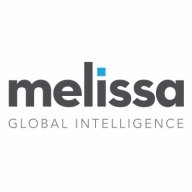

Qlik Talend Cloud and Melissa Data Quality compete in the data management category, each offering distinct features that cater to specific business needs. Qlik Talend Cloud holds an edge in terms of pricing and support, while Melissa Data Quality is preferred for its powerful features despite higher costs.
Features: Qlik Talend Cloud offers integration capabilities, data transformation tools, and a robust set of components for handling various workflows. In contrast, Melissa Data Quality provides advanced data cleansing, address verification, and geocoding features, focusing on data integrity and accuracy.
Room for Improvement: Qlik Talend Cloud could benefit from enhanced data accuracy tools, better address verification features, and improved cleansing options. Melissa Data Quality might improve its cost structure, provide more competitive pricing, and offer enhanced integration capabilities to broaden its appeal.
Ease of Deployment and Customer Service: Qlik Talend Cloud supports multiple environments, allowing easy integration into existing systems, with reliable customer service. Melissa Data Quality ensures straightforward deployment with specialized support for complex data issues, benefiting those needing in-depth assistance.
Pricing and ROI: Qlik Talend Cloud is more budget-friendly, appealing to businesses focused on ROI by offering effective data manipulation at a lower cost. Melissa Data Quality requires a higher initial investment but provides substantial ROI through precise data enrichment features, justifying its premium price with long-term value.
| Product | Market Share (%) |
|---|---|
| Qlik Talend Cloud | 6.6% |
| Melissa Data Quality | 3.4% |
| Other | 90.0% |
| Company Size | Count |
|---|---|
| Small Business | 12 |
| Midsize Enterprise | 3 |
| Large Enterprise | 14 |
| Company Size | Count |
|---|---|
| Small Business | 20 |
| Midsize Enterprise | 11 |
| Large Enterprise | 18 |
Data Quality Components for SSIS
This suite of data transformations for Microsoft SQL Server Integration Services (SSIS) delivers the full spectrum of data quality including data profiling, data verification, data enrichment and data matching. With an intuitive interface and drag/drop capabilities, this powerful toolkit makes it easy to unify data into a single version of the truth for Master Data Management (MDM) success.
Qlik Talend Cloud provides robust data integration tools tailored for efficient management of large volumes, offering real-time data access, Java integration, and custom code capabilities for developers.
Qlik Talend Cloud is known for its extensive connectivity options, enabling seamless integration across different platforms, such as S3, Redshift, Oracle, and SQL Server. The central repository facilitates consistent metadata access throughout organizations, enhancing collaboration. Despite its strengths in advanced monitoring, automation, and user-friendly drag-and-drop interfaces, users face challenges with installation stability, technical support, documentation inconsistencies, and complexities in learning. Performance concerns also include multitasking limitations and excessive memory usage. The platform's licensing costs can be prohibitive for smaller companies, while demands for improved data governance and intuitive code management continue. Its applications in healthcare data parsing, ETL task automation, and diverse data platform integration demonstrate its utility, although there's a constant demand for better scalability and efficient transformations.
What are the key features?In specialized industries like healthcare, users leverage Qlik Talend Cloud for data integration and transformation, aiding in compliance and analytics. Compatibility with cloud and on-premises systems ensures adaptability to complex data tasks, facilitating business application development. Organizations focus on enhanced data ingestion and quality checks for comprehensive solutions.
We monitor all Data Quality reviews to prevent fraudulent reviews and keep review quality high. We do not post reviews by company employees or direct competitors. We validate each review for authenticity via cross-reference with LinkedIn, and personal follow-up with the reviewer when necessary.